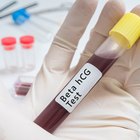What Causes Raised HCG Levels?
Human chorionic gonadotropin, or hCG, is considered to be a pregnancy hormone. If you are not pregnant, you will have low levels of the hormone, but it rises significantly during pregnancy. Specifically, it slowly rises after conception -- peaks around nine to 12 weeks -- falls somewhat and then stabilizes until you give birth. Several factors can cause your hCG level to rise beyond normal for your condition.
Multiple Fetuses
A higher than normal hCG level may be due to the existence of multiple fetuses such as twins or triplets, according to the American Pregnancy Association. This is true whether the multiples are identical or fraternal. High hCG levels are not a reliable indicator of multiple fetuses, however, because each woman and each pregnancy varies.
Hydatidiform Mole

What Is the Average HCG Level at 4 Weeks?
Learn More
A hydatidiform mole occurs when an egg is fertilized and attaches to your uterus, but the pregnancy is not viable. Instead of a fetus growing inside the placenta, a small growth of tissue that resembles a bunch of grapes forms. This can happen when your egg is missing genetic material or is fertilized by more than one sperm. Problems inside your uterus and a nutrient-deficient diet can also cause a hydatidiform mole. For several weeks or months, you may have elevated hCG levels and believe you are pregnant with a normally growing fetus only to learn it is a molar pregnancy. Rarely, a hydatidiform mole co-exists in the uterus along with a healthy, growing fetus, says MedlinePlus.
Choriocarcinoma
Choriocarcinoma is a form of cancer that may develop in your uterus. It most commonly occurs after a hydatidiform mole, an abortion, an ectopic pregnancy or a tumor in the genital region. Occasionally, it develops after a healthy pregnancy. Symptoms include vaginal bleeding and an elevated hCG level.
Medication

What Are the Causes of Low HCG Levels?
Learn More
Medications containing hCG may temporarily raise hCG levels. These medicines are typically used in fertility treatments, says the American Pregnancy Association.











